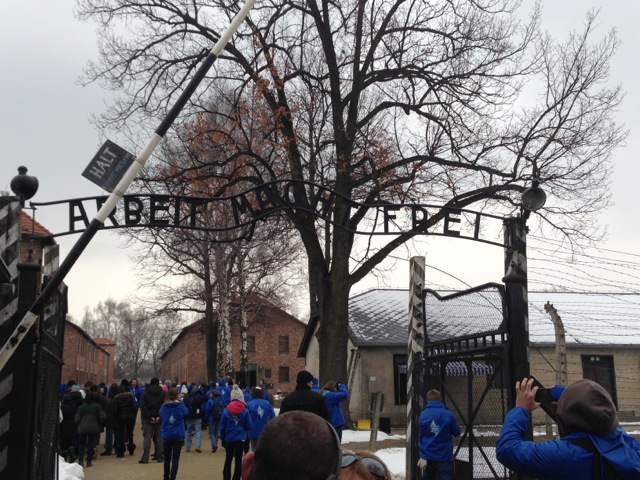Reflections of an Internship
The Holocaust has always been a topic close to my heart. Not only because I am Jewish and Israeli, but also because I’ve been learning about the Holocaust since my childhood. Last year, I felt the strongest connection to the Holocaust when I attended March of the Living, a two-week trip to Poland and Israel.
I spent the first week visiting concentration camps including Auschwitz, Birkenau, Majdanek, and Treblinka. The march includes tens of thousands of Jews from all over the world who march from Auschwitz to Birkenau to honor all of those who were murdered in their “march to death.” While it was incredibly difficult and emotional to tour the concentration camps, the day of the march I had a feeling of optimism that I will never forget. The Jews are a unified people, and we are so lucky to be alive today, free to practice our religion. People from all over the world were marching, many of them wrapped in Israeli flags, symbolizing that we are a group who have a homeland to go to, and are here to stay. I traveled on the trip with Trudy Album, a Jewish survivor who was imprisoned at Auschwitz-Birkenau and other concentration camps.
I remember walking through the gate ARBEIT MACHT FREI, work will make one free, holding her hand and thinking, how can she walk back into a place with her head held high, where she was tortured and her family was murdered? I guess that is part of her message: We march because we are living, and we march for those who cannot do so themselves. We have a responsibility to keep their memories alive, not only for Jewish people but individuals around the world. When I returned from the march, I felt incredibly passionate about this duty and promised myself I would not forget how deeply connected it is to my identity.
 March of the Living 2013 in Auschwitz.
March of the Living 2013 in Auschwitz.Interning this semester in the managing director’s office has not only taught me vital skills about how an organization is run, but has also shown me that USC has many values that are aligned with mine. I am proud to attend a university that recognizes the importance of preserving the memories of genocide victims. Teaching through testimony is a method of educating students about the Holocaust; and I believe education is truly the only solution towards preventing future genocides.
I feel incredibly optimistic that the USC Shoah Foundation has the power to make such a difference in the world. I will be forever grateful for this internship, as it has given me the opportunity to play a minor, yet, meaningful role in changing the world through testimony.
Like this article? Get our e-newsletter.
Be the first to learn about new articles and personal stories like the one you've just read.